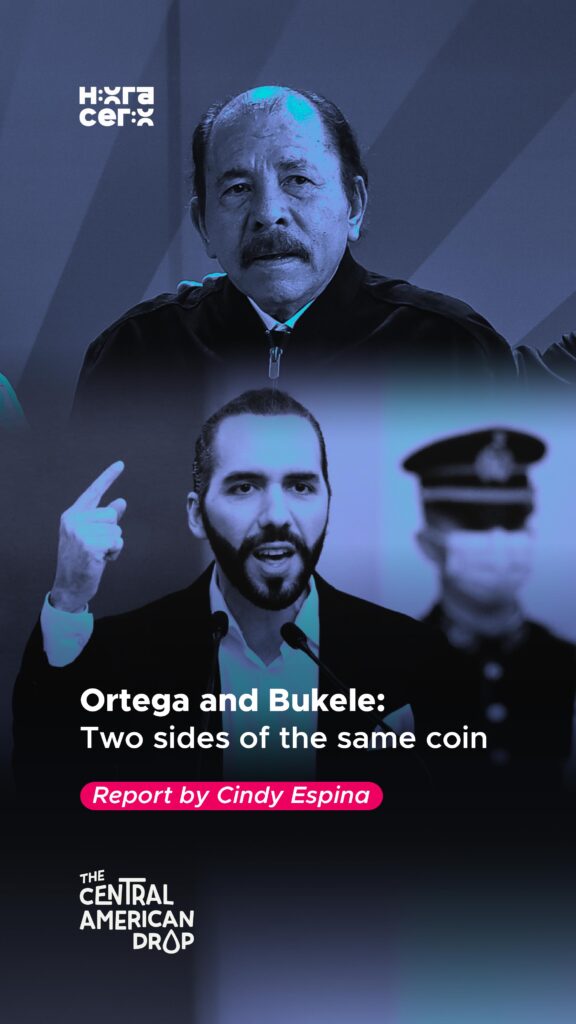
In this report, we analyze five key points that demonstrate how both leaders have resorted to similar tactics to consolidate power, weaken democratic institutions, and repress dissent.
Both Ortega and Bukele have made the critical press a declared enemy. In El Salvador, more than 40 journalists have gone into exile so far in 2025, according to the Salvadoran Journalists Association. This wave of repression is not new: in 2021, the IACHR had already granted precautionary measures to 34 Salvadoran reporters. Although Bukele publicly denies it—even before the UN—data shows that his government has created a hostile climate for the press, similar to that experienced in Nicaragua.
In Nicaragua, the repression is even more extensive. Since 2018, at least 283 journalists have been forced to flee the country for safety reasons. More than 60 media outlets have been shut down, and cases like the murder of journalist Ángel Gahona in April of that year—which remains unpunished—reflect the level of violence and impunity faced by those who practice journalism. What took Ortega years to build, Bukele has replicated in just one presidential term.
Both governments have also opted to imprison their critics. In El Salvador, between 2021 and 2023, the United States government identified at least 11 political prisoners, while the Committee of Relatives of Political Prisoners and Persecuted Persons recorded 28 arrests through March 2025. Notable among them is Ruth López, a lawyer and former head of the Anti-Corruption Unit of Cristosal, who was arrested and charged with illicit enrichment after years of pointing out government irregularities.
In Nicaragua, the figures are even more alarming. In June 2019 alone, more than 520 political prisoners were released. In 2023, 222 prisoners were expelled from the country and stripped of their nationality. The last group of 135 was sent to Guatemala in 2024. According to the IACHR, at least 52 people remain imprisoned for political reasons in Nicaragua. The logic is the same in both cases: to stifle criticism, weaken the opposition, and send a message of punishment to anyone who dares to question power.
Both Ortega and Bukele have promoted laws targeting social organizations, media outlets, and human rights defenders that receive international funding. In Nicaragua, the Foreign Agents Law, passed in 2020, requires organizations to register and report their activities monthly. The law has been used to block registrations, cancel legal status, and close more than 5,600 civil society organizations.
In El Salvador, a similar version was implemented after a peasant protest outside the president’s residence. Bukele accused NGOs of inciting the demonstration and responded with a law imposing a 30% tax on international funds and prohibiting activities that, according to the government, «disturb public order.» The message is clear: any attempt at autonomous organization will be seen as a threat.
Ortega and Bukele have also violated their respective constitutions to stay in power. Bukele managed to circumvent the constitutional ban on reelection through a ruling by the Constitutional Chamber—appointed by a Congress dominated by his party—that reinterpreted the law in his favor. In 2024, he temporarily stepped down from the presidency to run again, and today he governs under a mandate that many consider illegitimate. Even constitutional lawyers who challenged his candidacy, such as Enrique Anaya, have been arrested.
Daniel Ortega, for his part, has spent years perfecting his power structure. After returning to the presidency in 2007, he promoted constitutional reforms that allowed for indefinite reelection. Added to this is the dismantling of the opposition, the co-optation of all state institutions, and the systematic use of repression as a tool of control. Ortega transformed his persona as a former revolutionary guerrilla into an authoritarian leader who shows no signs of stepping down.
Finally, both leaders have been accused of using power to favor their inner circles. An investigation by Regional Editorial and FocosTV revealed that between 2019 and 2024, Bukele and his associates accumulated properties valued at more than $9 million. Although he insists his government is «cleaning up corruption,» evidence points to the contrary.
In Nicaragua, the Ortega-Murillo family has consolidated an economic empire with at least 22 companies registered in family names, ranging from oil companies to music production companies. Their children hold public positions and control media outlets, ministries, and state resources. A large part of their fortune was accumulated during the years of Venezuelan cooperation, when Chavismo transferred millions of dollars in resources without any oversight.
| Cookie | Duración | Descripción |
|---|---|---|
| cookielawinfo-checkbox-analytics | 11 months | This cookie is set by GDPR Cookie Consent plugin. The cookie is used to store the user consent for the cookies in the category "Analytics". |
| cookielawinfo-checkbox-functional | 11 months | The cookie is set by GDPR cookie consent to record the user consent for the cookies in the category "Functional". |
| cookielawinfo-checkbox-necessary | 11 months | This cookie is set by GDPR Cookie Consent plugin. The cookies is used to store the user consent for the cookies in the category "Necessary". |
| cookielawinfo-checkbox-others | 11 months | This cookie is set by GDPR Cookie Consent plugin. The cookie is used to store the user consent for the cookies in the category "Other. |
| cookielawinfo-checkbox-performance | 11 months | This cookie is set by GDPR Cookie Consent plugin. The cookie is used to store the user consent for the cookies in the category "Performance". |
| viewed_cookie_policy | 11 months | The cookie is set by the GDPR Cookie Consent plugin and is used to store whether or not user has consented to the use of cookies. It does not store any personal data. |